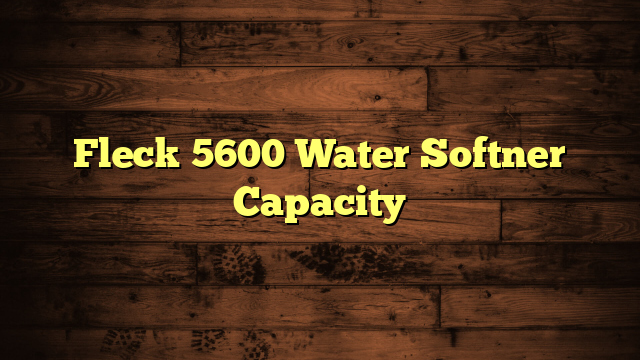How to Calculate the Water Softner Grain Capacity?
Many people underestimate the importance of accurately calculating their water softener's grain capacity, which can lead to inefficiencies and increased costs. To get started, you'll first need to assess your daily water usage and the hardness of your water. But how do you combine these factors to determine the right capacity for your system? Understanding this process not only helps you select the appropriate softener but also guarantees its longevity and effectiveness. Let's explore the steps involved in making this important calculation.
Key Takeaways
- Measure daily water usage by tracking consumption habits, averaging 80 to 100 gallons per person per day.
- Test water hardness using test strips, digital testers, or laboratory tests to find grains per gallon.
- Calculate daily grain removal using the formula: Daily water usage (gallons) x Hardness level (grains per gallon).
- Determine total grain capacity by multiplying daily grain removal by the number of days between regenerations.
- Regularly monitor and maintain salt levels to ensure effective regeneration and optimal performance of the water softener.
Understanding Water Hardness
Often, people underestimate the impact of water hardness on their daily lives. You mightn't realize that the mineral composition of your water directly affects its quality. Hard water contains high levels of calcium and magnesium, which can lead to various problems in your home.
For instance, you might notice soap scum on your dishes or a film on your shower walls, leaving you frustrated. When you use hard water, it can interfere with soap's ability to lather properly, making cleaning tasks less effective.
Furthermore, over time, these minerals can build up in your plumbing and appliances, leading to costly repairs or replacements. By understanding the water quality in your area, you can make informed decisions about whether you need a water softener.
Testing your water can reveal its hardness level, providing you with insight into its mineral composition. Armed with this knowledge, you can take steps to improve your water quality, enhancing your daily activities.
It's important to remember that softening your water can't only improve your cleaning routines but also extend the lifespan of your appliances, saving you money in the long run.
Factors Affecting Grain Capacity
When it comes to calculating your water softener's grain capacity, several key factors come into play.
Water hardness levels, household water usage, and the system's efficiency rating all greatly impact how well your softener performs.
Understanding these elements will help you make informed decisions about your water treatment needs.
Water Hardness Levels
Understanding water hardness levels is essential for determining the grain capacity of your water softener. Water hardness is primarily caused by minerals, such as calcium and magnesium, that dissolve in your water supply.
These minerals can create scale buildup in pipes and appliances, leading to inefficiencies and costly repairs. To effectively manage this issue, you need to measure the hardness of your water accurately.
There are several measurement methods available, including test strips, digital water testers, and laboratory testing. Test strips are quick and easy, giving you a visual representation of water hardness.
Digital testers provide a more precise reading, while lab tests offer the most accurate results, albeit with a longer wait time.
Once you know your water hardness level, you can better evaluate the grain capacity required for your softener. This capacity indicates how much hardness your system can remove before needing regeneration.
If you neglect to take these levels into account, your softener may not function at its best, leading to hard water issues. As a result, measuring your water hardness is the first step in ensuring you choose the right grain capacity for your water softener.
Household Water Usage
Household water usage plays an essential role in determining the grain capacity your water softener needs. Understanding your household consumption is imperative because it directly impacts how much softened water you'll require.
Start by evaluating your daily habits—how many people live in your home, and what their average water use looks like.
For instance, consider activities like showering, laundry, and dishwashing. Each of these contributes to your overall water consumption. On average, a family of four might use around 300 gallons of water daily. This figure can fluctuate based on lifestyle choices, such as taking longer showers or using more water for gardening.
You should also factor in any appliances that may use water, like washing machines and dishwashers. If you have a large family or frequently host guests, your water usage can increase markedly.
By accurately calculating your household's total water consumption, you can better estimate the grain capacity your water softener should have, ensuring it meets your needs without shortchanging you when it comes to soft water supply.
Keep track of these details, and you'll make a more informed decision about your water softener's grain capacity.
System Efficiency Rating
Evaluating the system efficiency rating of your water softener is essential for determining its grain capacity. This rating reflects how well your system performs in softening water and directly influences the amount of hard water it can handle before regeneration. Understanding the efficiency metrics helps you choose a water softener that meets your household needs effectively.
Here's a quick reference table to illustrate how different factors affect system efficiency:
| Factor | Impact on Efficiency | Notes |
|---|---|---|
| Resin Type | High | More efficient resin leads to better performance. |
| Flow Rate | Moderate | A faster flow rate can reduce contact time and efficiency. |
| Regeneration Frequency | Low | More frequent regeneration can improve efficiency but may increase salt usage. |
Calculating Daily Water Usage
To determine the right grain capacity for your water softener, you first need to calculate your daily water usage. Start by tracking your water consumption patterns over a week. This includes everything from drinking and cooking to showering and laundry.
To simplify your daily usage calculations, divide the total water used in that week by seven.
You'll want to take into account the number of people in your household, as this directly impacts your daily water usage. On average, a person uses about 80 to 100 gallons of water each day, so multiply that by the number of residents.
Don't forget to account for specific activities that might increase your consumption, like excessive laundry or long showers.
Once you have your daily average, you can use this number to help determine how much grain capacity your water softener needs.
By understanding your daily water usage, you'll be better equipped to select a system that meets your household's needs without wasting resources.
Accurate calculations are essential for achieving ideal water softness while ensuring efficiency and cost-effectiveness.
Determining Water Softener Efficiency
Understanding water softener efficiency is essential for ensuring you get the most out of your investment. Different softener types, like ion exchange or salt-free systems, can considerably influence efficiency ratings.
When you're evaluating a water softener, look for the efficiency rating, which indicates how effectively the unit removes hardness from water relative to its salt usage.
A high efficiency rating means you'll use less salt and water over time, translating to lower operating costs. For example, a softener with an efficiency rating of 1,500 grains per pound of salt means it can remove 1,500 grains of hardness for every pound of salt used.
To determine the best option for your home, compare the efficiency ratings of various models. Keep in mind that while a higher initial investment might seem intimidating, it can lead to savings in the long run.
Moreover, consider how often you'll need to regenerate the softener, as this can affect your water and salt usage. By evaluating softener types and their efficiency ratings, you can choose a system that not only fits your budget but also meets your water quality needs effectively.
Using the Grain Capacity Formula
To effectively calculate your water softener's grain capacity, you need to understand what grain capacity really means.
It refers to the total amount of hardness minerals your system can remove before it needs to regenerate.
Understanding Grain Capacity
Grain capacity is an important factor in determining how effectively your water softener can handle hard water. When you think about grain units, remember that this measurement indicates how much hardness your system can remove before it needs regeneration.
Understanding this capacity measurement is essential for ensuring your water softener operates efficiently and meets your household needs.
In practical terms, grain capacity tells you the total amount of hardness in grains that your water softener can treat. For instance, if your unit has a capacity of 30,000 grains, that means it can effectively soften 30,000 grains of hardness before it requires a refill of salt or regeneration cycle.
It's significant to assess your household's water hardness level and daily water usage to determine the appropriate grain capacity for your specific situation.
Applying the Formula
Calculating the grain capacity of your water softener involves a simple formula that takes into account your household's water usage and hardness levels.
To get started, you'll need two key figures: your daily water consumption in gallons and the hardness of your water in grains per gallon.
The formula application is straightforward: multiply your daily water usage by the hardness level.
Then, multiply that result by the number of days between regenerations.
For example, if your household uses 300 gallons of water daily, and your water hardness is 10 grains per gallon, your softener calculation would look like this:
300 gallons x 10 grains = 3,000 grains per day.
If you regenerate every 7 days, you'd multiply 3,000 by 7, giving you a total grain capacity of 21,000 grains.
This number tells you how much hardness your water softener can handle before it needs to regenerate.
Selecting the Right Water Softener
Choosing the right water softener is essential for ensuring you get the most effective solution for your home's water quality. Start by evaluating the current state of your water. You can test hardness levels to determine how much mineral content is present. This knowledge helps you choose an appropriate system.
Next, consider the various softener types available. You might explore ion exchange systems, which replace hard minerals with sodium, or salt-free softeners, which don't remove minerals but rather condition them to prevent scale buildup. Each type has its advantages, depending on your specific needs and preferences.
Think about the size of your household as well. Larger families typically require a unit with a higher grain capacity to handle daily water usage.
Also, take into account your budget; while some systems may have a higher upfront cost, they could save you money in the long run through reduced energy bills and extended appliance life.
Finally, don't forget to read reviews and possibly seek recommendations from friends or professionals. This research will help you confidently select the right water softener that caters to your home, effectively enhancing your water quality.
Maintenance Tips for Longevity
To guarantee your water softener lasts for years, regular maintenance is essential. Start with routine checks every few months. Inspect your system for any signs of leaks or wear and tear, as catching issues early can save you from costly repairs down the line.
Keep an eye on the salt levels in the brine tank, and refill it as needed to guarantee peak performance.
Additionally, don't overlook filter replacement. Depending on your water quality, you might need to change your filters every six months to a year. Dirty filters can hinder your softener's efficiency, leading to harder water and potential damage.
Cleaning the resin bed is also vital for maintaining effectiveness. Use a resin cleaner every couple of years to remove any buildup of minerals or contaminants.
Lastly, keep the area around your softener clean and free from debris, as a cluttered space can affect performance.
Frequently Asked Questions
What Is the Difference Between Grains and Gallons in Water Softening?
In water softening, grains measure the hardness of water, while gallons refer to the volume used. Understanding this difference helps you optimize your system's performance and guarantee efficient water treatment for your needs.
Can I Use a Water Softener for Well Water?
Yes, you can use a water softener for well water. It'll improve water quality by reducing hardness, but you should test your water first to guarantee it's suitable for softening and doesn't contain harmful contaminants.
How Often Should I Regenerate My Water Softener?
To maintain ideal softener efficiency, you should adjust the regeneration frequency based on your water usage and hardness levels. Generally, regenerating every 7-14 days works well, but individual needs may vary.
What Signs Indicate My Water Softener Needs Replacement?
When evaluating water softener maintenance, look for replacement indicators like decreased water quality, salt buildup, unusual noises, or frequent regeneration cycles. If you notice these signs, it might be time to contemplate a replacement.
Are There Any Health Risks Associated With Softened Water?
Softened water generally poses minimal health risks, but some people may experience health effects from increased sodium levels, especially those on low-sodium diets. It's wise to consult a doctor if you have specific health concerns.
Conclusion
In summary, calculating your water softener's grain capacity is a straightforward process that guarantees your home enjoys the best water quality. By understanding your daily usage and water hardness, you can confidently select a system tailored to your needs. Remember, investing in a proper water softener not only enhances your water experience but also extends the life of your plumbing and appliances. With a little diligence, you'll be well on your way to enjoying softer, more pleasant water.







